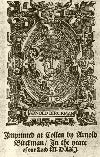
 |
[Thesaurus pauperum. English]
A Most Excellent and Perfecte Homish Apothecarye, or Homely Physick Booke, for All the Grefes and Diseases of the Bodye.
Translated out of the Almaine speche into English by Jhon Hollybush. Cologne: Imprinted at Collen by Arnold Birckman, in the yeare of our Lord 1561. With: Turner, William. A New Herball. London: Imprinted by Steven Mierdman, 1551. By H. Brunschwig, first issued as part 5 of his Liber de arte distillandi de compositis, Strasbourg, 1512 --Cf. Hunt 84. First ed. of this translation. Translation may have been done by W. Turner, using Hollybush's name--Cf. Johnston, S. H. Cleveland coll. 85. References: Hunt 84; Johnston, S. H. Cleveland coll. 85; STC, 13433.
Brunschwig was a Strassburg surgeon best known for his works in surgery and pharmaceutical distillation (See PAT-104). This work is the first edition of the English translation a Pharmacopeae for the poor. William Turner is often called the Father of English Botany, because his was the first original botanical work in English to have a scientific basis. All previous English botanical works were based on European plants exclusively. To remedy this, Turner's first publication in 1538, Libellus de re herbaria novus (The New Little Book about Plants) describes plants from Northumberland which had never before been mentioned in any botanical texts. Because Turner refused to accept the teachings of the Church of England and became a vocal spokesman for the Reformation, he was jailed for two years. Later he was exiled to the Continent and all his published works were destroyed. He made the most of his time spent in exile, meeting with botanists in Europe as he travelled, and gathering botanical specimens. Following the death of Henry VIII he returned to England and was appointed physician and chaplain to the Lord Protector Edward Duke of Somerset. He published the first part of his herbal in 1551, dedicating it to the Duke. When Edward VI died, Mary I, a Catholic, became Queen. She had no tolerance for those sympathetic to the Reformation and once again Turner's books were banned. As a result, complete copies of the first part of Turner's New Herball, issued separately, are almost never found; most of them were destroyed. When Turner was exiled again, he continued his study of European plants while preparing the second part of his herbal. After five years in exile he was once again able to return to the English court. He published the second part of his herbal in Cologne, in 1562, rather than in England, partly because he no longer trusted the English, and partly because Birckman, his publisher in Cologne, had access to the woodcuts used by Fuchs. Turner finished part three of his herbal only a few months before his death in 1568. Turner describes more than 200 species native to England, thereby adding plants "whereof is no mention made neither of ye old Grecianes nor Latines." Arrangement of the herbal is alphabetical, under each plant's Latin name, without any attempt to show relationships.
Subjects: Medicine--Formulae, receipts, prescriptions.
PAT-144a